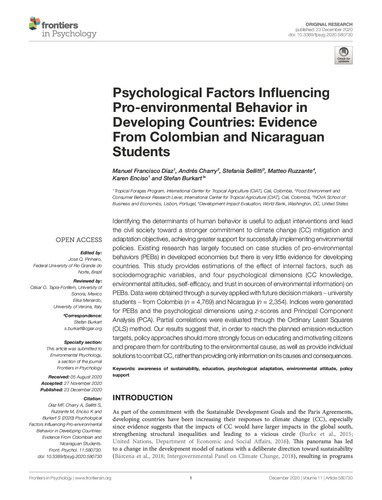Psychological factors influencing pro-environmental behavior in developing countries: Evidence From Colombian and Nicaraguan students
Identifying the determinants of human behavior is useful to adjust interventions and lead the civil society toward a stronger commitment to climate change (CC) mitigation and adaptation objectives, achieving greater support for successfully implementing environmental policies. Existing research has largely focused on case studies of pro-environmental behaviors (PEBs) in developed economies but there is very little evidence for developing countries. This study provides estimations of the effect of internal factors, such as sociodemographic variables, and four psychological dimensions (CC knowledge, environmental attitudes, self-efficacy, and trust in sources of environmental information) on PEBs. Data were obtained through a survey applied with future decision makers – university students – from Colombia (n = 4,769) and Nicaragua (n = 2,354). Indices were generated for PEBs and the psychological dimensions using z-scores and Principal Component Analysis (PCA). Partial correlations were evaluated through the Ordinary Least Squares (OLS) method. Our results suggest that, in order to reach the planned emission reduction targets, policy approaches should more strongly focus on educating and motivating citizens and prepare them for contributing to the environmental cause, as well as provide individual solutions to combat CC, rather than providing only information on its causes and consequences.

